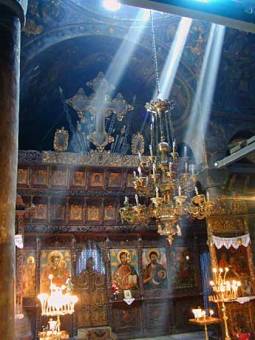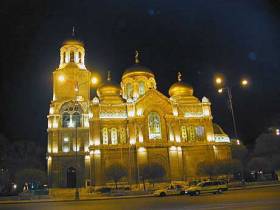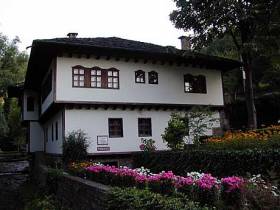
Head office location:
Bulgaria
Elhovo
Headoffice address:
8, Targovska Str., floor 2, Elhovo, Bulgaria
Phones: +359 877777960;
+359 885841230;
+359 887762939
sales@bulgarianestates.org

The History of Bulgaria (the Bulgarian state the descendant of which is the present-day Republic of Bulgaria; to be differentiated from Great Bulgaria and Volga Bulgaria) begins in the 7th century AD with the arrival in the Balkan Peninsula of the Bulgars, who had been moving north-westwards across the Caucasus and what is now southern Russia and the Ukraine. The origin of the Bulgars is not entirely clear. The established theory is that the Bulgars are related to the Huns, and more distantly the Turks, a position which is increasingly challenged by a theory claiming Aryan - Pamirian origin of the Bulgars. The Bulgars were governed by hereditary Khans and a class of nobles called boyars. Religiously, they were monotheists, and starting in the 8th century many in Volga Bulgaria converted to Islam. They were a warlike people who spent most of their time on horseback, raiding their neighbours and moving from place to place.
In the 6th and 7th century the Bulgars had lived on the northern coast of the Black Sea. Under pressure from peoples further east, such as the Khazars, one confederation of Bulgars, the Kutriguri, moved into the territory which is now Romania in the 6th century. By 681 they had crossed the Danube into what is now Bulgaria. The Utiguri Bulgars settled on the Volga, where they converted to Islam and maintained an independent state until the 13th century.
Bulgaria under Ottoman rule
The Ottomans reorganised the Bulgarian territories as the Beyerlik of Rumili, ruled by a Beylerbey at Sofia. This territory, which included Thrace and Macedonia, was divided into five sanjaks, each ruled by a Sanjakbey accountable to the Beylerbey. The Ottoman Empire existed primarily to fight wars. Once an area was conquered, the Ottomans lost interest in it. They called their non-Muslim...› Details
The First Bulgarian Empire
The GreatBulgaria in Roman times had been called Moesia and had a mixed population of Thracians, Greeks and Dacians, most of whom spoke either Greek or a sub-Latin language known as Romance. It had been overrun by the Slavs in the mid 7th century. In 681 the Bulgars founded a Khanate on the Danube after the defeating the Byzantine army under Emperor Justinian II in a battle south of the...› Details
The Second Bulgarian Empire
The Byzantines ruled Bulgaria from 1018 to 1186, subordinating the independent Bulgarian Orthodox Church to the authority of the Ecumenical Patriarch in Constantinople but otherwise interfering little in Bulgarian local affairs. There were rebellions against Byzantine rule in 1040-41, the 1070s and the 1080s, but these failed. By the late 12th century the Byzantines were in decline after a...› Details
The struggle for independence
 Bulgarian national feeling began to revive in the early 19th century under the influence of western ideas such as liberalism and nationalism, which trickled into the country after the French revolution, mostly via Greece. The Greek revolt against the Ottomans which began in 1821 (see History of Ottoman Greece), also influenced the small Bulgarian educated class. But Greek influence was...
Bulgarian national feeling began to revive in the early 19th century under the influence of western ideas such as liberalism and nationalism, which trickled into the country after the French revolution, mostly via Greece. The Greek revolt against the Ottomans which began in 1821 (see History of Ottoman Greece), also influenced the small Bulgarian educated class. But Greek influence was...› Details
Independent Bulgaria
Stefan Stambolov. Prince Alexander had conservative leanings, and at first opposed Stambulov's policies, but by 1885 he had become sufficiently sympathetic to his new country to change his mind, and supported the Liberals. He also supported the unification of Bulgaria and Eastern Rumelia, which was brought about by a coup in Plovdiv in September 1885. The Powers protested but none of them...› Details
The Balkan Wars
In 1911 the Nationalist Prime Minister, Ivan Geshov, set about forming an alliance with Greece and Serbia, and the three allied agreed to put aside their rivalries to plan a joint attack on the Ottomans. In February 1912 a secret treaty was signed between Bulgaria and Serbia, and in May 1912 a similar treaty was signed with Greece. Montenegro was also brought into the pact. The treaties...› Details
War and social conflict
In the aftermath of the Balkan Wars Bulgarian opinion turned against Russia and the western powers, whom the Bulgarians felt had done nothing to help them. The government of Vasil Radoslavov aligned Bulgaria with Germany and Austria-Hungary, even though this meant also becoming an ally of the Ottomans, Bulgaria's tradional enemy. But Bulgaria now had no claims against the Ottomans,...› Details
World War II and after
Under Filov's government Bulgaria drifted into World War II, bribed by the return of southern Dobruja from Romania, on the orders of Hitler (see Vienna Award), in September 1940. In March 1941 Bulgaria formally signed the Tripartite Pact, becoming a German ally, and German troops entered the country in preparation for the German invasion of Greece. When Yugoslavia and Greece were...› Details
Communist Bulgaria
Although Dimitrov had been in exile, mostly in the Soviet Union, since 1923, he was far from being a Soviet puppet. He had shown great courage in Nazi Germany during the Reichstag Fire trial of 1933, and had later headed the Comintern during the period of the Popular Front. He was also close to the Yugoslav Communist leader Tito, and believed that Yugoslavia and Bulgaria, as closely related...› Details
Democratic Bulgaria
By the time the impact of Mikhail Gorbachev's reform program in the Soviet Union was felt in Bulgaria in the late 1980s, the Communists, like their leader, had grown too feeble to resist the demand for change for long. In November 1989 demonstrations on ecological issues were staged in Sofia, and these soon broadened into a general campaign for political reform. The Communists reacted...› Details















